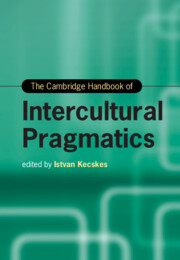Book contents
- The Cambridge Handbook of Intercultural Pragmatics
- Cambridge Handbooks in Language and Linguistics
- The Cambridge Handbook of Intercultural Pragmatics
- Copyright page
- Contents
- Figures
- Tables
- Acknowledgment
- Contributors
- Introduction The Rise of Intercultural Pragmatics
- Part I Theoretical Foundation
- Part II Key Issues in Intercultural Pragmatics Research
- Part III Interface of Intercultural Pragmatics and Related Disciplines
- Part IV Intercultural Pragmatics in Different Types of Communication
- 21 Visual and Multimodal Communication across Cultures
- 22 Intercultural Teamwork via Videoconferencing Technology: A Multimodal (Inter)action Analysis
- 23 Intercultural Communication in Computer-Mediated Discourse
- 24 Intercultural Aspects of Business Communication
- 25 Intercultural Pragmatics in Healthcare Communication
- 26 Academic and Professional Discourse in Intercultural Pragmatics
- 27 The Dynamic Model of Meaning Approach: Analyzing the Interculturality of Conspiracy Theory in Far-Right Populist Discourses
- Part V Language Learning
- Index
- References
22 - Intercultural Teamwork via Videoconferencing Technology: A Multimodal (Inter)action Analysis
from Part IV - Intercultural Pragmatics in Different Types of Communication
Published online by Cambridge University Press: 29 September 2022
- The Cambridge Handbook of Intercultural Pragmatics
- Cambridge Handbooks in Language and Linguistics
- The Cambridge Handbook of Intercultural Pragmatics
- Copyright page
- Contents
- Figures
- Tables
- Acknowledgment
- Contributors
- Introduction The Rise of Intercultural Pragmatics
- Part I Theoretical Foundation
- Part II Key Issues in Intercultural Pragmatics Research
- Part III Interface of Intercultural Pragmatics and Related Disciplines
- Part IV Intercultural Pragmatics in Different Types of Communication
- 21 Visual and Multimodal Communication across Cultures
- 22 Intercultural Teamwork via Videoconferencing Technology: A Multimodal (Inter)action Analysis
- 23 Intercultural Communication in Computer-Mediated Discourse
- 24 Intercultural Aspects of Business Communication
- 25 Intercultural Pragmatics in Healthcare Communication
- 26 Academic and Professional Discourse in Intercultural Pragmatics
- 27 The Dynamic Model of Meaning Approach: Analyzing the Interculturality of Conspiracy Theory in Far-Right Populist Discourses
- Part V Language Learning
- Index
- References
Summary
This chapter examines the miscommunication of an intercultural team working on a task via videoconferencing technology using English. We utilize multimodal (inter)action analysis (Norris, 2004, 2011, 2019, 2020) as our theoretical and methodological framework to shed new light on how participants appear to negotiate and co-construct common ground, while they in fact do not achieve conceptual convergence but, instead, produce their own actions. The data for this chapter comes from a corpus of twelve dyads working on tasks via videoconferencing technology in New Zealand. Data was collected from various English monolingual and Serbian multilinguals in various interactive constellations. In this chapter, we focus on a dyadic team with a Serbian native speaker and a monolingual New Zealand English speaker. Rajic and Norris (2018) show that Serbian native speakers’ nonverbal actions vastly differ from New Zealand English speakers’ nonverbal actions. While the difference in production of nonverbal actions is relevant in all interactions, they do not necessarily lead to intercultural miscommunications. However, as noted earlier, interactive alignment is not just a linguistic accomplishment (Pirini & Geenen 2018). Our results conflict somewhat with those of other scholars (House, 1999; Mauranen, 2006), who claim that few miscommunications occur in English as a Lingua Franca interactions. Owing to our analysis, we would like to claim that miscommunications in linguistically and culturally diverse communicative situations are more frequent than previously thought. However, many of the miscommunications that occur cannot be said to come about because of cultural differences.
- Type
- Chapter
- Information
- The Cambridge Handbook of Intercultural Pragmatics , pp. 552 - 587Publisher: Cambridge University PressPrint publication year: 2022
References
- 3
- Cited by

